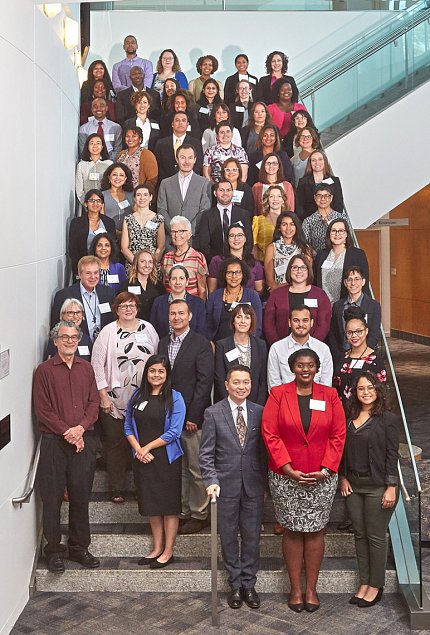HDRI
Program Provides Blueprint for Young Researchers

Photo: Jeff Elkins
The Health Disparities Research Institute (HDRI) is an endeavor to support the career development of early-stage investigators and stimulate research in the disciplines supported by minority health and health disparities science. During the 5-day program, scholars hear lectures from prominent researchers, network with NIH scientific program staff across various institutes and centers and participate in a grant-writing session, small group discussions and a mock grant review.
Fifty early-stage investigators were selected to participate in the annual HDRI held recently on campus, sponsored by the National Institute on Minority Health and Health Disparities. Participants represented 25 states, the District of Columbia, Guam and Puerto Rico. “Participants were selected based on their proposed unique research ideas and demonstration of their ability to readily apply what they’re learning to future research and potential to become future leaders in the field,” said HDRI course director Dr. Richard Palmer.
On her native Micronesian island of Guam, part of U.S.-affiliated Pacific Islands, Dr. Tressa Diaz is both a social worker and research scientist. An assistant professor in the division of social work at the University of Guam School of Health, she spoke of her interest in improving the health of indigenous people of the region.
“I am committed to addressing and exploring social determinants of cancer disparities within Pacific Islander communities,” she said. “The HDRI provided examples of what a good application could look like in terms of not only technicalities of writing, but also conceptualizing. You’re seeing models of what people have done, which can help you expand possibilities. In a way, being at the HDRI has contradicted feelings of isolation as a researcher [on the island of Guam] because we get to collaborate and we see many of us are committed to doing this work.”
Born to immigrant parents and having faced socioeconomic adversities while growing up in Texas, Dr. Cassandra Johnson, now an assistant professor of nutrition and foods in the School of Family and Consumer Sciences at Texas State University, is passionate about improving access to nutritious foods for people of rural areas and border towns of Texas. These people are at greater risk of food insecurity, which can lead to serious health problems. She echoed other scholars and intends to apply for an R15 award, which supports small-scale research projects. “I will apply the principles learned during the HDRI course and determine how to integrate new digital health technologies into research,” she said.
NIMHD is committed to training and fostering the development of the next generation of minority health and health disparities research scientists. “We want to encourage diversity and expand the pipeline so that NIMHD and other NIH institutes and centers receive more applications from these scholars focused on the field of minority health and health disparities research,” said NIMHD director Dr. Eliseo Pérez-Stable. The next HDRI will be held Aug. 3-7, 2020.
Participants left the event with skills that will enable them to submit competitive research applications to NIH. More importantly, they are committed to enhancing NIMHD’s mission by leading scientific research to improve and make a transformative difference in minority health and reduce health disparities in underserved communities.
Watch the 2019 HDRI video at https://www.youtube.com/watch?v=5FRKXP7EOgM&
feature=youtu.be.
